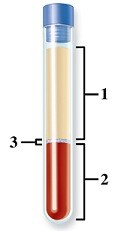"A refractory period occurs following all types of potentials." Is this statement TRUE or FALSE? What structures are actually refractory? Why or why not?
What will be an ideal response?
False. The refractory period occurs after action potentials and is a distinguishing characteristic, and results from properties of the voltage-gated sodium channels. Graded potentials do not involve channels that have refractory periods. Two stimuli that reach a dendrite at nearly the same time will increase the graded potential produced, whereas if two suprathreshold depolarizations reach the trigger zone at nearly the same time, the first will cause an action potential and the second will be ignored, because of the refractory period.
You might also like to view...
 In the centrifuged sample of blood illustrated, what blood components are contained in the layer labeled number 3?
In the centrifuged sample of blood illustrated, what blood components are contained in the layer labeled number 3?
A. Plasma and water B. Leukocytes and platelets C. Plasma, water, waste materials, and electrolytes D. Erythrocytes E. Leukocytes and waste materials
The chief type of reaction used during catabolism is ________.
A. dehydration synthesis B. hydrolysis C. hydration D. hydrogen bonding
In this condition, all layers of the adrenal show insufficiency:
a. Cushing's b. Lordon's c. Conn's d. Addison's e. both (c) and (d)
Which of the following statements describes the effect of hormones secreted by the thymus gland?
A. These hormones lower blood Ca2+ levels. B. These hormones stimulate growth. C. These hormones increase blood glucose levels. D. These hormones stimulate the development of the immune system. E. These hormones increase blood Ca2+ levels.